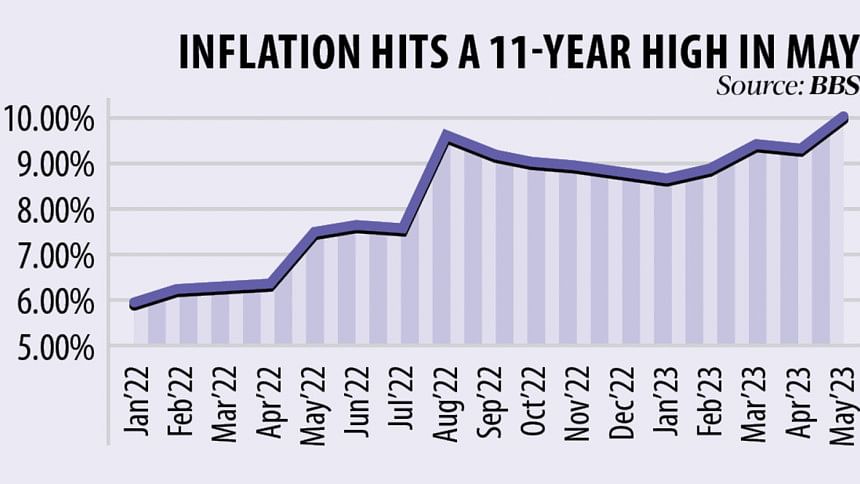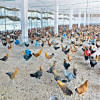Inflation hits 11-year high

If there is one indicator that epitomises the government's mismanagement of the economy in recent times, it is inflation -- which raced to an 11-year high of 9.94 percent in May.
May's figure takes the average inflation so far this fiscal year to 8.95 percent, way above the budgetary target of 5.6 percent.
The government pinned the blame for the elevated inflation levels entirely on the Ukraine war that began in February last year.
"If inflation was 100 percent imported, why did it not rise elsewhere?" said Zahid Hussain, a former lead economist of the World Bank's Dhaka office.
In reality, inflation is on the decline all around the world.
In May, Eurozone inflation fell to its lowest level since Russia's invasion of Ukraine to 6.1 percent. Inflation in Germany and France fell to 6.3 percent and 6 percent respectively.
Even the runaway inflation in Turkey hit its lowest level since 2021 in May. Thailand's inflation hit a 16-month-low, while China's consumer price index was the lowest in more than two years. In Vietnam, inflation was 2.43 percent, the lowest level in 14 months.
Although the inflation data for the US and India are yet to be released for May, April's data give a good indication: it eased to 4.9 percent in the UK and 4.7 percent in the neighbouring country, which is an 18-month-low.
The initial spiral in price level could be blamed on the war taking place 5,800 kilometres away.
"But that is not the case in the last six months," Hussain said.
What it can be blamed on is the government's lack of measures to cool down demand.
"Of course, there is supply-side pressure stemming from the dollar crunch. But the government's measures fuelled inflation further."
One such misadventure of the government is the excessive bank borrowing to fund the budget deficit arising out of sluggish revenue collection from the decelerating economy, thanks, again, to the dollar crunch, according to Hussain.
Between July 1 last year and May 24, the government took loans to the tune of Tk 85,024 crore from the banking system. Of the sum, Tk 69,208 crore came from the Bangladesh Bank.
Thanks to the borrowing from the central bank, the volume of notes and coins in circulation is increasing manifold. In Bangladesh, this money can multiply by as much as five times. So, the Tk 69,208 crore may end up being Tk 346,040 crore.
This extra money in the hands of people is creating additional demand for goods and services, which, in turn, is driving up the prices.
Then the government's abandonment of the austerity stance taken at the beginning of the fiscal year nine months in also fanned the inflationary flames.
"The prime minister said the economic situation is okay now," Shamsul Alam, the state minister for planning, told reporters as he emerged from the meeting of the National Economic Council presided over by Sheikh Hasina on March 1.
Less than a fortnight later, most of the austerity measures were withdrawn. For instance, the ban on purchase of vehicles, aircraft, helicopters, boats, ships and barges, which was the centrepiece of the austerity measure, was lifted, while low-priority projects were given funds.
Amid dwindling dollar stockpile and inflationary pressure, what was the need to lift the bar on such expenditure?
May's inflation data also reflects the knock-on effect of the hike in electricity, gas, fuel and fertiliser prices that transpired earlier this fiscal year.
What is more unfortunate is the government does not seem to have any plan to rein in the escalating prices.
In the proposed budget for fiscal 2023-24, Finance Minister AHM Mustafa Kamal sought record bank borrowing to fund the deficit, a large part of which would most definitely be coming from the central bank.
"What could be a worse nightmare for the common people than the inflation rising and real wage rate and employment declining?" Hussain said.
In fact, for the poor and low-income people, their reality appears to be an endless trial.
Shariful Islam, a construction worker in Dhaka's Mirpur-11, is barely getting by these days. Construction work has declined markedly over the last five-six months because of the price spiral of rods and cement, leaving Islam gainfully employed for 10-11 days a month.
That is not enough to feed three square meals to his family of four.
The family has already left out meat and fish from their meals and switched to a completely vegetarian diet along with cutting down on portion size to the bare minimum.
"But the vegetables are also becoming dearer. I have already borrowed money from many to continue with my children's schooling. If things continue this way, I don't know how I will get by at all," he said.
Food inflation rose to 9.24 percent in May from 8.84 percent the previous month. Non-food inflation increased 24 basis points to 9.96 percent in May.
Islam's neighbour Kohinoor Begum, who runs a roadside tea stall, is scrimping in the kitchen, too.
"We can no longer afford oil, lentils, sugar, meat and fish in our meals," she said, while wondering if the comfortable life her family had two years back would ever come back.
The elderly Wasi Ahmed in Mohammadpur is wondering the same.
"We don't feel full after meals. But even then, our expenditure is only increasing. How will we survive like this?" he told The Daily Star yesterday.
In urban areas, inflation increased to 9.97 percent last month from 9.68 percent in April.
Over in Satkhira, Tauhidul Islam, an electrician, has similar grievances.
"It's tough to run the house with the prices of everything rising like this. My income did not increase."
Inflation in rural areas stood at 9.85 percent, up from 8.92 percent in April.
Islam has switched to all economic options for sustenance, but that will not be enough.
"If the government helps us, it will bring us some relief," he said.
But that is unlikely to happen.
In the proposed budget for the incoming fiscal year, Kamal did not make any allocation to cushion the poor from the wrath of inflation.
In fact, the social safety net budget is smaller than the current fiscal year's both in proportion to the overall budget and GDP.
Even then, as much as 60 percent would be going towards those not in dire need.
In reality, just 1.01 percent of the GDP would be spent on the poor via the social safety net schemes -- and not 2.52 percent, as touted by the government.

 For all latest news, follow The Daily Star's Google News channel.
For all latest news, follow The Daily Star's Google News channel. 








Comments